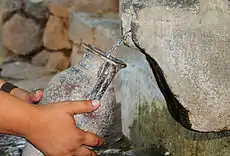Castalia
Castalia /kəˈsteɪliə/ (Ancient Greek: Κασταλία), in Greek mythology, was a naiad-nymph, a daughter of Achelous who inhabited the Castalian spring in Delphi. In older traditions, Castalian spring already existed by the time Apollo came to Delphi searching for Python.[1] According to some, the water was a gift to Castalia from the river Cephisus. Latin poet Lactantius Placidus in his commentary on Statius' Thebaid tells that to escape the amorous advances of Apollo, Castalia transformed herself into a fountain at Delphi, at the base of Mount Parnassos, or at Mount Helicon.[2] Castalia could inspire the genius of poetry to those who drank her waters or listened to their quiet sound; the sacred water was also used to clean the Delphian temples. Apollo consecrated Castalia to the Muses (Castaliae Musae).
 Water Ritual at Delphi | |
| Grouping | Legendary creature |
|---|---|
| Sub grouping | Water spirit |
| Country | Greece |
| Region | Delphi |
| Greek deities series |
|---|
| Nymphs |
The 20th century German writer Hermann Hesse used Castalia as inspiration for the name of the futuristic fictional utopia in his 1943 magnum opus, The Glass Bead Game. Castalia is home to an austere order of intellectuals with a twofold mission: to run boarding schools for boys, and to nurture and play the Glass Bead Game.
See also
- Castalian Spring
- Castalia House
- 4769 Castalia, an Earth-crossing asteroid
References
- Homer, Hymn to Apollo
- "Castalia". Encyclopædia Britannica.